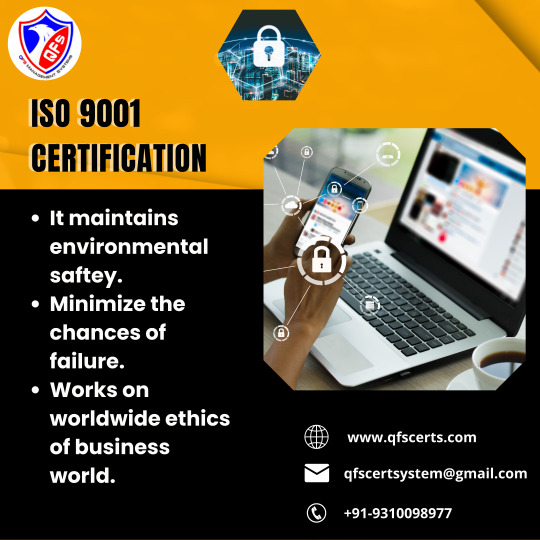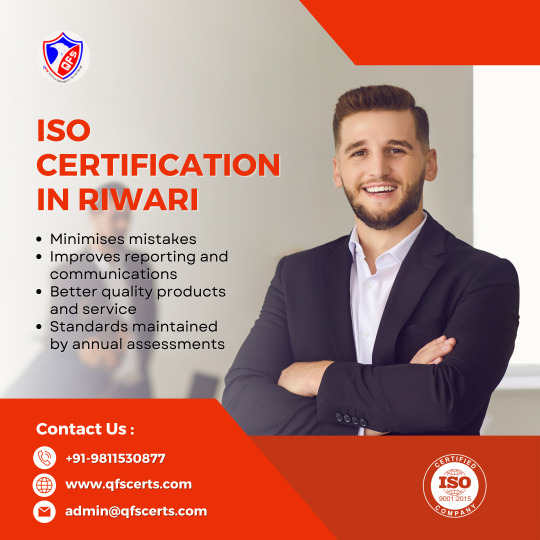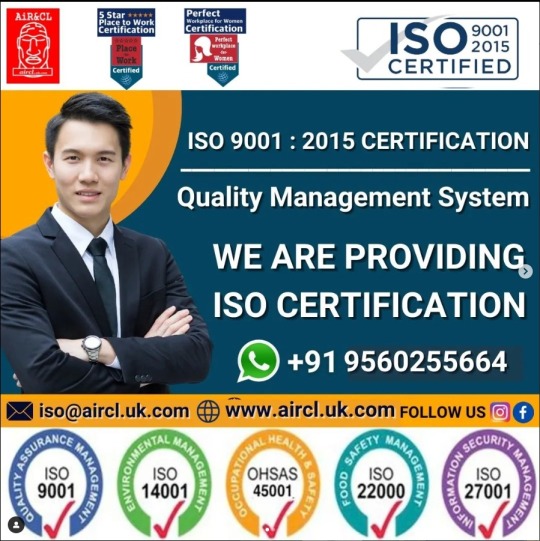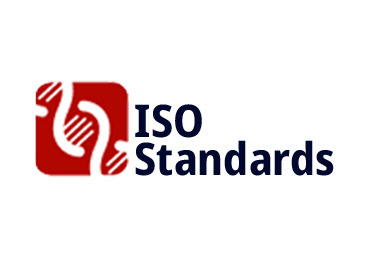#iso 9001 standard
Text
ISO 9001 certification helps in qms | qfscerts
ISO 9001 certification provides a quality management structure that companies use to assure that the quality of their products and services is compatible. ISO 9001 2015 certification is a product that lowers the chance of failure and reminds you how to address the service’s failings while assuring that your clients can shop trustfully.
It works on worldwide ethics of business industries. This play a crutial part in the effective delivery of quality goods and services. It maintains the manufacturing of products goods in a better and safer way. ISO 9001 quality management system instrument is published by the International Organization for Standardization. Qfscerts can help you to get the certification.
For more info: https://bit.ly/3RVzmHV

9001 ISO 2015
ISO 9001 standard
ISO 9001
#9001 ISO 2015#ISO 9001 standard#ISO 9001#ISO 9001 certification#ISO 9001 2015 certification#ISO 9001 quality management system
2 notes
·
View notes
Text
What is ISO 9001 & Why it is Important in Australia
In Australia, ISO 9001 is well respected as a foundation for quality management. It describes how businesses might improve their practises to adhere to high standards. By ensuring that goods and services continuously satisfy consumer needs, ISO 9001 promotes patronage and trust. Businesses in Australia can excel, enhance customer happiness, and stay competitive in the market by putting a focus on efficient operations and ongoing improvement.
What is ISO 9001?

A well-known quality management system that assists businesses in ensuring that their goods and services uphold high standards is ISO 9001. Consider it a road map that directs businesses to take the best possible action. It's similar to having a winning formula. The procedures a company should follow to produce goods that satisfy customers' needs are laid forth in ISO 9001. These actions help businesses streamline their operations, reduce errors, and deliver high-quality products consistently. In addition to keeping customers happy, this aids in the expansion and success of enterprises.
Why ISO 9001 Important in Australia?
ISO 9001 is really important in Australia because it's like a quality stamp for businesses. Just like you trust a restaurant with good reviews, ISO 9001 shows that a company meets high-quality standards. In Australia, where people care about getting value for their money, ISO 9001 helps businesses deliver reliable products and services. This makes customers happy and builds trust. Plus, it helps companies improve how they work, reducing mistakes and waste. When businesses follow ISO 9001, they become stronger, more competitive, and contribute to a better overall economy in Australia
What are the ISO 9001 Requirements?
Businesses must adhere to a set of guidelines and standards known as ISO 9001 criteria in order to receive the certification that serves as a universally acknowledged symbol of quality. These specifications emphasise the need for a strong quality management system in order for an organisation to continuously provide goods and services that satisfy consumer wants and legal obligations.
The main ISO 9001 requirements are:
Context of the Organization: Businesses need to understand their internal and external factors, identify stakeholders, and define the scope of their quality management system.
Leadership: Leadership plays a crucial role in setting the direction and commitment to quality within the organization.
Planning: Companies must establish clear quality objectives, make plans to achieve them, and manage risks and opportunities.
Support: This involves providing the necessary resources, competent personnel, and an environment conducive to achieving quality goals.
Operation: This section covers the execution of planned processes, including product/service design, production, and service delivery.
Performance Evaluation: Organizations must monitor and measure their processes, products, and customer satisfaction to ensure they are meeting quality standards.
Improvement: Continuous improvement is a key principle. Companies must take corrective and preventive actions to address issues and enhance their quality management system.
How ISO 9001 Works?
ISO 9001 works as a framework to help organizations improve their quality management practices and deliver better products or services. Here's how it works:
Understanding and Adapting: A business decides to implement ISO 9001 standards. They study the requirements and figure out how to apply them to their specific operations.
Setting Up Systems: The company establishes processes, policies, and procedures that align with ISO 9001 requirements. These systems help ensure consistent quality.
Documentation: Important information about how things are done is documented, making it easy for employees to follow the right steps and for auditors to verify compliance.
Training and Awareness: Employees are trained to understand the new systems and how their roles contribute to quality. Everyone becomes aware of their responsibilities.
Implementation: The company puts the new systems into practice. They start following the documented processes, focusing on customer needs, minimizing mistakes, and optimizing resources.
Monitoring and Measuring: Regular checks are conducted to monitor how well the systems are working. Performance metrics are tracked to see if quality goals are being met.
Corrective and Preventive Actions: If issues or errors arise, the company takes corrective actions to fix them and prevent similar problems in the future. This contributes to continuous improvement.
Internal Audits: The company performs internal audits to ensure that their systems are compliant with ISO 9001 requirements and that quality is being maintained.
Certification Audit: An external certification body audits the organization's systems and practices. If everything aligns with ISO 9001 standards, the company receives ISO 9001 certification.
Continuous Improvement: ISO 9001 encourages organizations to keep seeking ways to enhance quality, streamline processes, and boost customer satisfaction. This creates a cycle of ongoing improvement.
What are Benefits of ISO 9001?

ISO 9001 brings a basket of benefits to businesses that adopt its principles and achieve certification. Here are some important benefits:
Improved Quality: ISO 9001 emphasizes quality management, leading to better products and services that consistently meet customer expectations. This helps in building a strong reputation and customer loyalty.
Enhanced Customer Satisfaction: By focusing on understanding and meeting customer needs, ISO 9001 helps businesses deliver products and services that leave customers satisfied and happy.
Increased Efficiency: Processes are streamlined, waste is decreased, and resource use is maximised by implementing ISO 9001. This boosts operational effectiveness and reduces costs.
Better Decision Making: With data-driven processes and performance measurements, ISO 9001 enables informed decision-making, helping companies identify areas for improvement and growth.
Stronger Management Systems: ISO 9001 sets a structured framework for an organization's management systems, improving communication, responsibility assignment, and accountability.
Competitive Advantage: The international recognition of ISO 9001 certification can give it an advantage in the marketplace. Many clients and partners prefer working with certified companies due to their proven commitment to quality.
Market Access: Some markets and industries require ISO 9001 certification as a prerequisite for participation. This certification opens doors to new business opportunities.
Employee Engagement: Clear processes and defined responsibilities lead to better employee understanding of their roles. This can boost morale and engagement within the organization.
Continuous Improvement: ISO 9001 encourages companies to constantly assess their performance, identify areas for enhancement, and strive for continuous improvement.
Risk Management: By addressing risks and opportunities, ISO 9001 helps companies proactively manage potential issues, reducing the likelihood of problems occurring.
Regulatory: Regulatory requirements in different businesses frequently match ISO 9001 standards. Implementing them can aid in compliance with legal and industry standards.
How Much Does it Cost to get ISO 9001 Certification in Australia?

The price of ISO 9001 certification in Australia might vary based on a number of elements, such as the size and complexity of your organisation, the industry you're in, the certification body you select, and the degree of assistance you need.
The price could be lower for small enterprises or organisations with simpler operations, possibly ranging from a few thousand to several thousand Australian dollars. The rigorous review and documentation needed, however, may result in higher expenses for larger organisations with more complicated operations..
In addition to the certification body's fees, you should consider costs related to:
Consultation and Training: Some businesses choose to hire consultants or undergo training to understand and implement ISO 9001 requirements effectively.
Documentation and Implementation: Creating the necessary documentation and implementing new processes may require additional resources, including time and personnel.
Audits and Assessments: Besides the initial certification audit, there are ongoing surveillance audits to ensure compliance. These also contribute to the overall cost.
Maintenance: Keeping the ISO 9001 system running smoothly might require ongoing efforts, which could include employee training, process improvements, and corrective actions.
Travel and Additional Expenses: If the certification body is not local, there might be travel expenses associated with the audit.
How Do i Get ISO 9001 Certified?
Getting ISO 9001 certified involves several steps to ensure that your organization meets the standards and requirements set by ISO. Here's a general outline of the process:
Understand ISO 9001: Familiarize yourself with the ISO 9001 standard and its requirements. You can obtain the ISO 9001 standard document or use online resources to gain an understanding of what's involved.
Commitment and Planning: Top management needs to commit to the certification process. Create a plan outlining how you'll implement ISO 9001 within your organization.
Gap Analysis: Assess your current processes, policies, and practices against the ISO 9001 requirements. Identify gaps that need to be addressed.
Implement Changes: Based on the gap analysis, make the necessary changes to your processes, policies, and procedures to align them with ISO 9001 standards.
Documentation: Create the required documentation, such as quality manuals, procedures, work instructions, and records, to demonstrate your compliance with ISO 9001.
Training and Awareness: Train your employees on the new processes and how they contribute to ISO 9001 compliance. Ensure everyone is aware of their roles in maintaining quality.
Internal Audits: Conduct internal audits to verify that your organization's processes are compliant with ISO 9001. Identify areas for improvement and address any non-conformities.
Corrective Actions: Take corrective actions to address any issues identified during internal audits. Ensure that the root causes of problems are resolved.
Pre-Certification Audit (Optional): Some organizations choose to conduct a pre-certification audit to evaluate their readiness for the final certification audit.
Choose a Certification Body: Select an accredited certification body to conduct the final certification audit. This external audit is usually conducted by auditors who assess your organization's compliance.
Certification Audit: The certification audit involves a thorough examination of your organization's processes and documentation to determine if you meet ISO 9001 requirements.
Address Findings: If any non-conformities are identified during the certification audit, address them and provide evidence of corrective actions taken.
Certification: If your organization demonstrates compliance with ISO 9001 standards and addresses any non-conformities, the certification body will issue you an ISO 9001 certificate.
Surveillance Audits: After obtaining certification, you'll undergo periodic surveillance audits to ensure ongoing compliance with ISO 9001 requirements.
Is ISO 9001 Worth it?

Absolutely, ISO 9001 is worth considering! It's like a guide that helps businesses do things better. Imagine having a recipe for success. ISO 9001 helps improve how companies make products or offer services. This means fewer mistakes, better quality, and happier customers. Plus, it's recognized globally, so it boosts credibility. While getting ISO 9001 certified takes effort and investment, the benefits are impressive. Think of it as an investment in your business's future. It can lead to growth, more clients, and a stronger reputation. So, yes, ISO 9001 is definitely worth it for businesses aiming for excellence.
Which Company is Best for ISO 9001 Certification in Australia?

When it comes to choosing the best company for ISO 9001 certification in Australia, GCC (Global Compliance Certification) stands out. They have a strong reputation for helping businesses achieve ISO 9001 certification. GCC understands the needs of Australian companies and provides clear guidance on meeting quality standards. With their expertise and experience, they make the process easier to understand and navigate. Choosing GCC for ISO 9001 certification can be a smart move, ensuring that your business is on the right track to delivering top-notch quality and gaining trust in the market.
Author
Thank you for joining me on this journey through my blog post . I hope you found it informative and thought-provoking. If you have any questions or additional insights to share, please leave a comment below.
1 note
·
View note
Text
ISO 9001 is based on seven standards of quality management and attempts to help organizations be more efficient and enhance customer satisfaction. One prevalent confusion is that ISO 9001 is only for major corporations and manufacturers. However, the ISO 9001 criteria are generic and apply to any organization, regardless of its nature, size, or the products or services it delivers.
Small businesses are difficult to run. Why? Because a small group of individuals is seeking so many work duties at the same time, such as government regulations, laws, production and sales, supply chains, financial concerns, issues with quality, the labor force, and so on. Consistent quality services are what can enable a small business to become a viable and constantly growing organization. Consistency in procedures, quality, and systems will allow small businesses to consider bus improvements.
#ISO 9001#ISO 9001 Certification#ISO 9001 Manual#ISO 9001 Documents#Quality management System#Quality#ISO 9001 standard#ISO 9001 Audit#ISO 9001 Audit Checklist
0 notes
Text

The ISO 9001 standard is an internationally recognized quality management system (QMS) benchmark. It helps organizations establish and maintain efficient processes, improve customer satisfaction, and enhance overall performance. One crucial role within the ISO 9001 framework is that of the internal auditor. In this blog post, we will guide you through the steps to become a certified ISO 9001 internal auditor and highlight the relevant training courses to achieve this goal.
0 notes
Text
ISO Certification in Rewari | qfscerts
ISO certification in Rewari demonstrates that your company has a comprehensive Quality Management System (QMS). Quality Assurance plays the most important role in your career success. If your career is certified with ISO Certification Rewari then quality assurance will not be a problem at all. Quality Management is available in Rewari with ISO 9001 Global Assurance.
For More Info: https://bit.ly/3RtL5M7

0 notes
Text
Advantages of ISO 9001 for the business

In this, we'll look into ISO 9001's advantages. We'll provide real-world examples of how ISO 9001 (the world's most widely used quality management standard) affects customer and representative satisfaction, quality and usefulness, deal revenues, and company reputation. We'll draw on interviews with business pioneers, contextual analyses provided by ISO, and many years of our insight.
We'll examine the interior of ISO 9001, highlighting its benefits, and explain how adopting the standard might result in more benefits. To put it simply, we'll provide you with some good justifications for why ISO 9001 is perfect for your business.
Internal advantages of ISO 9001 for the business
The primary benefits of ISO 9001 certification are frequently internal rather than external. This has been confirmed by the International Organization for Standardization in a series of contextual investigations looking at how businesses across 20 different countries have benefited overall from ISO 9001. The following were identified as the main benefits:
1. Increased consumer dedication and loyalty
Customer satisfaction is a crucial area of attention for your business since it allows you to track how your clients see you objectively. A well-implemented quality management system will result in satisfied clients.
2. More contented and competent employees
Employee engagement and motivation are highly influenced by their sense of empowerment, which plays a significant part in creating a joyful, motivated workforce.
3. More superior goods and services
Better quality is often associated with - and expected from - businesses that have achieved ISO 9001 certification. The case studies that follow demonstrate how ISO 9001-certified companies have raised the caliber of their output.
4. Increased proficiency, fewer mistakes, and less time wasted
A number of the Standard's requirements result in both direct and indirect process benefits for reliability and efficiency. The operational procedures with less opportunity for error benefit from a better process approach and risk-based thinking, which are key to ISO 9001.
5. Reduced overall hazards in general
It shouldn't be surprising that the major benefit of ISO 9001 is functional rather than promotional. The goal of ISO 9001 was to provide organizations with a tool to address their main problems, and activities, and promoting benefits came later.
Also, Check -->> ISO 9001 Certification in Sri Lanka
The organization's marketing advantages of obtaining ISO 9001 certification
An ISO 9001 declaration is an excellent marketing tool. Displaying it on your website or in your company's records speaks volumes about your commitment to providing high-quality goods and services, happy customers and employees, and overall job productivity. The following are a few advantages of advertising:
Expanded agreements and a section of the industry as a whole
Fulfilling a requirement for business sale
Easier entry into international business areas
Reputable Prestige
Even while counting benefits may be important, it bears that ISO 9001 was designed to help organizations carry out their tasks, and the major benefits are frequently internal (i.e., functional) rather than external (i.e., promotional).
Also, Check -->> Cost of ISO 9001 Certification Implementation
To sum up the end
The most well-known quality management system in the world is ISO 9001. According to recent research, approximately 1,000,000 firms of all sizes and in a variety of industries are accredited. The benefits are numerous and have a big impact on both corporate culture and the underlying issue.
Not all organizations are benefiting equally from ISO 9001 certification. The execution strategies are crucial in many ways that assuming you need to understand what is involved in following the ISO 9001 standard in your organization in the Male.
Process for ISO 9001 Certification
To expedite and simplify the ISO 9001 Certification process. By providing, hiring a consultant will lead you and your company through the subsequent stages to obtaining ISO 9001 Certification.
Gap Analysis Training
Testing
Documentation & Test Report
Process Audit
External Audit
Certification and beyond
#ISO 9001#ISO 9001 Certification#ISO 9001 QMS#Quality Management System#ISO 9001 Quality Management System#QMS#ISO 9001 Standard
0 notes
Text
WHY DO WE NEED ISO 9001 CERTIFICATION (QUALITY MANAGEMENT SYSTEM)?
ISO 9001 is a standard that is recognized worldwide, we can say that ISO 9001 certification is quite a famous standard and organizations try to achieve ISO 9001 certificate to join in the race for a globally competitive market.
If your organization achieves an ISO 9001 quality management system certificate, then it is like demonstrating your commitment to envisioning a quality culture.
By implementing an ISO 9001 standard in organizations, we can have better-organized process control and transparency in all departments.
Quality is a culture that must be developed and not a product that can be bought, since with the help of the guidelines of this international standard, organizations can learn the objective of developing quality as a culture.
2 notes
·
View notes
Link
What is ISO 9001? ISO 9001 Certification Consulting
#ISO 9001 Certification Consulting#ISO 17025 Standard Accreditation and Consulting Los Angeles#ISO 17025 Standard Certification Consulting Los Angeles#ISO 45001 Training courses Online Los Angeles#ISO 13485 Quality Management System for Medical Devices Certification Consulting Los Angeles#ISO 45001 Training courses Online California#R2 Audit Training courses#R2 Training courses#R2v3 Masterclass training#ISO 13485 Standard Consulting Los Angeles#e-Stewards Certification and Consulting ISO 9001 Certification Consulting#AS9100C Training courses#ISO 9001 Consulting#ISO 9001 implementation consulting#ISO 9001 implementation training#ISO 9001 Certification and Auditor Training#ISO 9001 documentation#ISO 9001 online training#how to get iso 9001#R2 Certification Consulting#ISO 14001 online training#AS9100 certification consulting and training#ISO 45001 Consultant in California#iso 45001 transition
2 notes
·
View notes
Text

"Ready to elevate your business to new heights? Look no further than air&cl – your trusted partner in achieving ISO certification excellence. Let's soar above the competition with precision, reliability, and trust.
0 notes
Text

ISO Standards
We are an expert ISO Certification Consultants offering our ISO services in all across the United States and Globally
Navigating success together: We transform challenges into opportunities, delivering expert ISO standards solutions for your business breakthroughs. We help you empowering success through tailored strategies to obtain the ISO standards Certification.
#ISO consulting#iso certification services#iso certification online#iso 9001 standards#get iso 27001 certified#iso 270001 certification#iso for safety management#iso 20000 certification
1 note
·
View note
Text
How to Obtain ISO Certification in Dubai

ISO certification signifies a company’s commitment to adhering to internationally recognized ISO management systems. An impartial entity endorses ISO certification in UAE, validating a company’s credibility and enhancing its competitiveness for contracts. This certification instills confidence in potential clients regarding the company’s reliability and quality of products or services. Governed by the International Organization for Standardization (ISO), certifications such as ISO 9001:2015 cover various industry sectors and aim to improve organizational efficiency and product/service quality. Rather than imposing burdensome procedures, ISO certifications offer a customizable framework to streamline operations and encourage continuous improvement, addressing aspects from product/service quality to data security reliability.
Importance of ISO Standards in UAE
ISO standards are crucial in UAE as they represent a company’s commitment to maintaining global standards of excellence. ISO certification in UAE enhances credibility and reputation in the competitive market while optimizing operations and ensuring consistent quality. These standards also assist in regulatory compliance and promote a culture of ongoing improvement. Additionally, ISO certifications facilitate international trade opportunities by aligning with global standards.
Common ISO Standards in the UAE
Some common ISO standards in the UAE include:
ISO 9001:2015: Sets criteria for quality management systems, emphasizing customer focus and continuous improvement.
ISO 14001:2015: Manages environmental responsibilities systematically, supporting sustainability efforts.
ISO 27001:2015: Establishes information security management systems for safeguarding information assets.
ISO 45001:2018: Ensures employee health and safety through occupational health and safety management systems.
ISO 13485:2016: Tailors quality management system requirements for medical device manufacturers.
ISO 22000: Safeguards food safety across the entire food chain, from producers to retailers.
Furthermore, ISO 22301 for business continuity, ISO 50001 for energy management, ISO 21001 for education, and ISO 17025 for testing labs also play vital roles in meeting industry needs in the UAE.
How to Obtain ISO Certification in UAE?
To apply for ISO Certification in UAE, follow these steps:
Conduct Gap Analysis:
Evaluate existing operations against ISO standards.
Engage with experienced consultants for objective evaluation.
Generate a comprehensive report outlining necessary actions.
Implementation:
Implement recommended modifications to bridge gaps.
Adapt processes, introduce new procedures, and educate team members.
Thoroughly document changes and monitor progress.
Certification:
Prepare for certification audit after successful implementation.
Choose a reputable ISO certification body for evaluation.
Resolve non-conformities identified during the audit.
Obtain an ISO certificate to enhance business credibility.
Popular ISO Certifications in the UAE:
ISO 9001 Certification:
Recognized in Sharjah, Abu Dhabi, Dubai, and other cities.
Ensures adherence to Quality Management Systems (QMS).
Enhances market presence by meeting customer expectations.
Compliance with ISO 9001:2015 instills best practices and boosts credibility.
ISO 14001 Certification:
Focuses on Environmental Management Systems (EMS).
Demonstrates commitment to environmental responsibility.
Leads to cost reductions and improved operational efficiency.
ISO 22000 Certification:
Essential for the food industry, ensuring food safety.
Updated to ISO 22000:2018 to harmonize global requirements.
Vital for controlling safety hazards in food products.
ISO 22301 Certification:
Provides a framework for Business Continuity Management Systems (BCMS).
Standardizes processes for business continuity.
Enables quick recovery from disruptions and safeguards against reputational harm and financial losses.
Here’s a plagiarism-free version of the text in an active voice tone:
Business Benefits of ISO Certification
Strategic Asset: ISO certification simplifies operations and enhances customer trust, positioning UAE businesses favorably in the international marketplace by adhering to rigorous ISO standards.
Increased Customer Confidence: Certification demonstrates dedication to quality and dependability, leading to heightened customer satisfaction and loyalty. ISO standards, like ISO 9001, prioritize customer requirements, fostering repeat patronage.
Increased Efficiency: ISO standards clarify processes and responsibilities, boosting employee performance and overall productivity. Continuous improvement principles promote regular refinement, potentially yielding operational cost savings and increased profitability.
Risk Mitigation: Adherence to ISO standards, such as ISO 31000 for risk management, enables proactive identification and mitigation of potential risks. This approach safeguards reputation ensures compliance with legal mandates, and prevents financial penalties and loss of clientele.
Elimination of Trade Barriers: ISO certification simplifies global expansion for UAE businesses by facilitating international trade. Globally recognized ISO standards ease entry into new markets, dismantle trade obstacles, and foster trust among potential partners and suppliers, enhancing opportunities for collaboration.
Accessing New Markets and Clients: ISO certification serves as a passport for businesses to expand globally. It assures potential clients of adherence to recognized standards, crucial for building trust abroad and meeting diverse regulatory requirements. In the UAE, ISO certification goes beyond compliance, fostering stakeholder trust, operational excellence, and market expansion. Embracing ISO as a strategic investment is essential for staying ahead in evolving landscapes.
With Private Wolf Business Setup:
ISO certification in the UAE transcends mere compliance, symbolizing an organization’s unwavering commitment to excellence and a gateway to global success. Cultivating a culture of continuous improvement, prioritizing customer satisfaction, and fostering efficiency are fundamental to this esteemed certification.
By navigating the ISO certification process diligently, your business can attain recognition for quality and become a catalyst for growth and industry leadership. Adopt the expedition towards ISO certification with confidence, knowing it positions your enterprise to excel in the competitive landscape of the Emirates and beyond, resonating trust with clients and partners alike.
M.Hussnain
Private Wolf | facebook | Instagram | Twitter | Linkedin
#ISO Certificate#ISO Business Certificate#ISO Certification#ISO Certification in Dubai#iso 27001 audit#iso 9001#iso standard#Private Wolf
0 notes
Text
For those who are looking for a Medical Device Registration consultancy in Delhi ELT Corporate is there for you. You can connect with the team Of ELT Corporate Medical Device License and apply for it now. They will assist you and figure out all the required information for you. You only have to connect with the team on +91 9891-998-002.
For all manufacturers, Importers, & wholesalers of medical devices connect with us now for medical device registration In India.
#medical device#medical device registration#medical device loan license#manufacturer#importers#dealer#wholesale#elt corporate#bis certification#bis registration#bis license#iso certification#iso 9001#iso standard#bureau of indian standards#legal metrology
0 notes
Text
What is Risk Management as per ISO 31000:2018 Guidelines?
An international standard called ISO 31000:2018 offers concepts and recommendations for efficient risk management. This standard, called "ISO 31000:2018: Risk Management Guidelines," can be used by any kind of company, no matter how big or small.
ISO 31000 aims to help organizations develop a systematic and structured approach to identifying, assessing, managing, and monitoring risks.
Here are the key elements of risk management as per ISO 31000:2018:
Definition of Risk:
It acknowledges that risk can have both positive and negative consequences.
Principles of Risk Management:
These principles include integration with organizational processes, a structured and comprehensive approach, customizing the organization, taking a risk management process approach, and continual improvement.
Framework for Risk Management:
ISO 31000 emphasizes the establishment of a risk management framework within an organization.
This framework should include the commitment of the organization to risk management, the integration of risk management into governance and leadership processes, and the continual improvement of the framework.
Integration with Governance and Culture:
The standard underscores the importance of integrating risk management into the organization's governance structure and culture.
This includes ensuring that risk management is aligned with the organization's overall objectives, strategies, and decision-making processes.
Customization:
ISO 31000 recognizes that each organization is unique and that the risk management process should be tailored to fit the organization's context, objectives, and external and internal environment.
Communication and consultation:
Effective communication and consultation are essential components of risk management.
ISO 31000 emphasizes the need for clear and transparent communication of risk-related information throughout the organization.
Monitoring and Review:
Regular monitoring and review of the risk management process are crucial to ensuring its ongoing effectiveness.
This involves assessing the performance of risk treatments and updating the risk management plan as needed.
Continuous Improvement:
ISO 31000 emphasizes the importance of a continual improvement process for risk management.
This involves learning from experience, adapting to changes in the internal and external environment, and refining the risk management approach over time.
ISO 31000 provides a flexible and adaptable framework that organizations can use to enhance their ability to anticipate, understand, and respond to risk. It is a valuable tool for promoting a risk-aware culture and improving decision-making processes within an organization.

ISO 31000 Certification Benefits
Implementing ISO 31000 and adopting its principles and guidelines for risk management can bring several benefits to organizations.
Here are some key advantages:
1- Improved Decision-Making:
ISO 31000 helps organizations make informed and effective decisions by considering potential risks and their impact on objectives. This contributes to more reliable decision-making processes.
2- Enhanced Objective Achievement:
By systematically identifying, assessing, and managing risks, organizations are better positioned to achieve their objectives.
ISO 31000 facilitates a proactive approach to addressing potential obstacles to success.
3- Better Governance:
Integrating risk management into the organization's governance structure enhances overall governance processes.
This alignment ensures that risk management is embedded in strategic planning and decision-making at all levels.
4- Increased Stakeholder Confidence:
Stakeholders, including customers, investors, and regulators, often have greater confidence in organizations that demonstrate a systematic and transparent approach to managing risks.
ISO 31000 can enhance an organization's reputation and trustworthiness.
5- Enhanced Organizational Resilience:
According to ISO 31000, a strong risk management process helps organizations become more resilient in the face of uncertainties and unforeseen events. This resilience is crucial for maintaining business continuity and adaptability.
6- Cost Savings:
Proactively managing risks can lead to cost savings by preventing or minimizing the impact of adverse events. This includes avoiding financial losses, legal liabilities, and other expenses associated with unmanaged risks.
7- Competitive Advantage:
Organizations that effectively manage risks are often better positioned in the marketplace.
ISO 31000 certification or adherence to its guidelines can be a differentiator, providing a competitive advantage and potentially opening new opportunities.
8- Improved Resource Allocation:
Understanding and prioritizing risks allows organizations to allocate resources more efficiently.
9- Compliance with Legal and Regulatory Requirements:
ISO 31000 helps organizations stay in compliance with legal and regulatory requirements by promoting a structured and systematic approach to identifying and addressing risks associated with legal and regulatory changes.
10- Enhanced Communication:
The risk management process encourages effective communication and consultation within the organization.
Clear communication of risk-related information improves transparency and understanding among stakeholders.
Encourages a Risk-Aware Culture:
ISO 31000 promotes a culture of risk awareness throughout the organization. Employees at all levels become more attuned to potential risks and contribute to risk management efforts.
ISO 31000 Certification Requirements
ISO 31000 is a guidance standard, not a certification standard, which means that organizations cannot be certified to ISO 31000 in the same way they can be certified to other ISO management system standards like ISO 9001 or ISO 14001.
While ISO 31000 itself is not designed for certification, there are other ISO standards related to risk management that can be used for certification purposes.
For example:
1- ISO 31004:2013 - Risk Management and Guidance for the Implementation of ISO 31000:
ISO 31004 provides additional guidance on the implementation of the principles and guidelines presented in ISO 31000. While not a certification standard, it can assist organizations in applying the concepts outlined in ISO 31000.
2- ISO 31010:2009 - Risk Management - Risk Assessment Techniques:
ISO 31010 provides guidance on various techniques for risk assessment. Despite not being a certification standard, organizations can use it to improve their risk assessment procedures.
3- ISO 27001:2013 - Information Technology, Security Techniques, Information Security Management Systems, Requirements:
While ISO 31000 focuses on general risk management principles, ISO 27001 certification specifically addresses information security risk management. Organizations can seek certification from ISO 27001 to demonstrate their commitment to managing information security risks.

Why Choose Us
I can provide you with general considerations when choosing a certification body for ISO 31000 or other ISO standards.
When selecting a certification body, including the TUV Austria Bureau of Inspection and Certification, you might want to consider the following factors:
Accreditation
Experience and expertise
Global Recognition
Transparency
Competence of Auditors
Costs
References and Reputation
Additional Services
Customer Support
Continuous Improvement
Before making a decision, it's advisable to contact the TUV Austria Bureau of Inspection & Certification directly, discuss your specific needs, and ask for detailed information regarding their services related to ISO 31000 or any other relevant standard.
Remember to check for updates or changes to the status of certification bodies, as industry landscapes and accreditation statuses can evolve over time.
0 notes